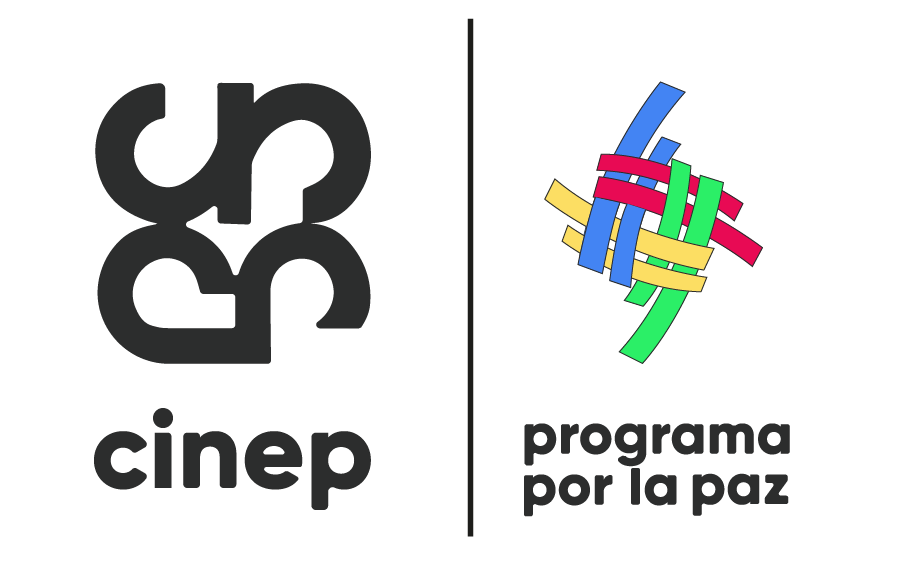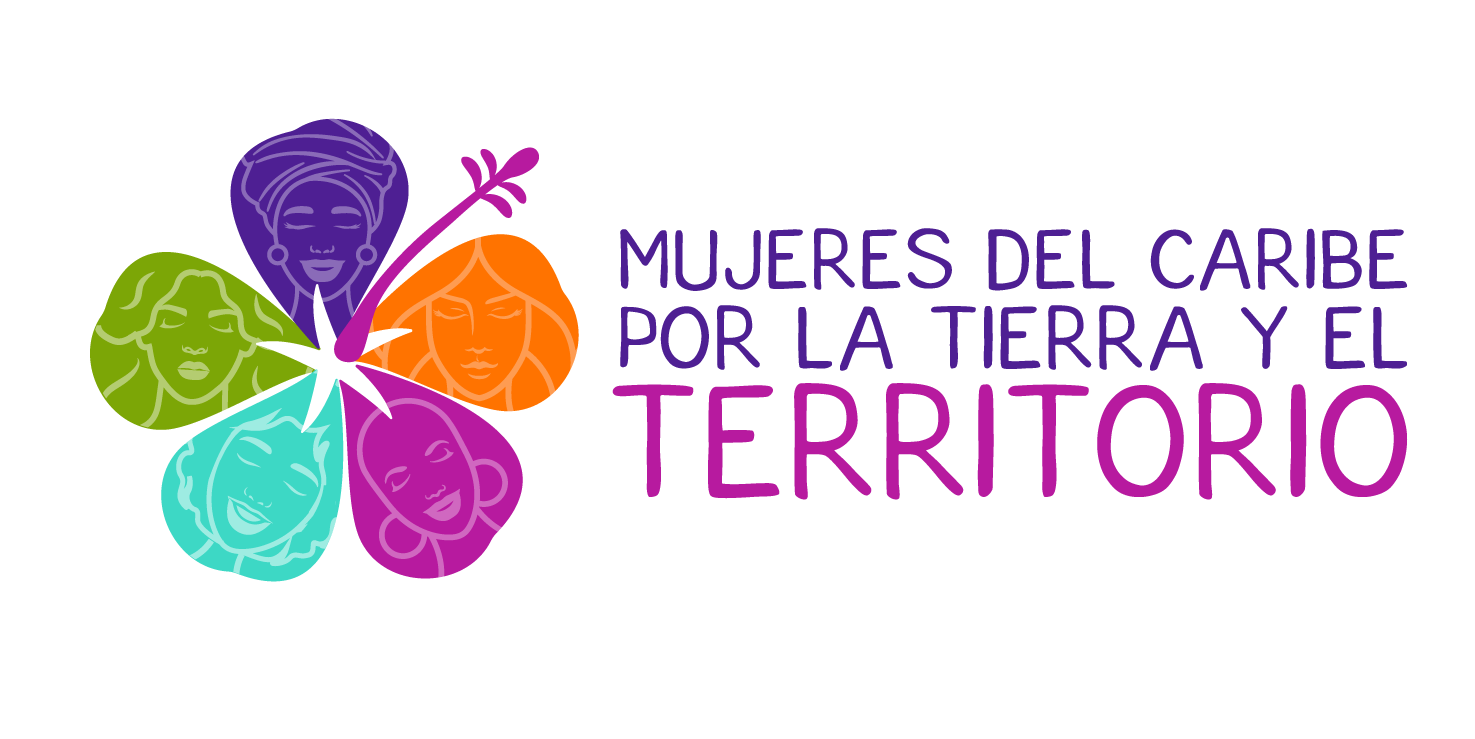In the backyards of houses in the Palo Altico neighbourhood, in the rural area of the municipality of María La Baja, Afro-Colombian families grow what they can for their own consumption. These ‘productive patios’ are largely maintained by the women of the community. Between aubergines, bananas, passion fruit and coconuts, they provide food for their families.
This rural vocation has not been confined to these areas. Their desire to acquire larger plots of land to develop productive projects has led them to a search that clashes with the scarcity of land. ‘There is no more land down here,’ says Victoria Silgado, sweat pouring down her face as she scythes her productive garden. ‘You can’t work where they’re planting palm trees,’ she laments.
The same story is heard over and over again in María La Baja, one of the 15 municipalities that make up the Montes de María region. The locals explain that oil palm and pineapple monocultures have taken root in the region, displacing the diverse agricultural vocation that had been one of the most important in the country since the middle of the last century.
For some villagers, working in these monocultures was a way to support their families, but several crises – including the palm blight – affected their economic stability. At the same time, women organised themselves to create alternative agricultural projects to improve their quality of life.
This is how the Association of Afro-Agricultural and Livestock Women Victims of Playón (ASOMOVICAMPO) was born. Made up of women from Palo Altico, the initiative took shape after renting a plot of land near the San José de Playón reservoir, which can be reached first by taking a boat for half an hour and then going on foot for another thirty minutes.
With the owner’s consent, they have tried to get the National Land Agency (ANT) to buy the land, as part of the agrarian policy promoted by the current national government, but according to this portal, the state body has not yet prioritised the purchase of rural property in Maria La Baja.
The lack of land titles is not the only obstacle facing the women of Montes de María. Although they own the land, they are also under threat from third parties who want to override their rights to dispossess them of their plots and prevent them from farming. This is the case of the Women’s Agricultural Association of San Cayetano (AFASAN), which owns land in the municipality of San Juan Nepomuceno.
This organisation has carried out several agricultural activities on their land, while outsiders have violated their property, their projects and their personal integrity. The most recent case was in 2020, when dozens of families invaded the land and demanded that the title be transferred to them.
In San Cayetano, the fact that these women were owners didn’t go down well. “Since we said we were owners, a lot of people have felt uncomfortable, especially the men. In their own words, ‘women are not capable of maintaining a plot of land’, and they have made life impossible for us,” says Duvis Ballesteros, 51, one of the members of AFASAN.
Women in the Montes de María can neither rent nor own land in the region with full enjoyment of the land, nor with legal and security guarantees. The stories of ASOMOVICAMPO and Asafan illustrate this.
Longing for ownership
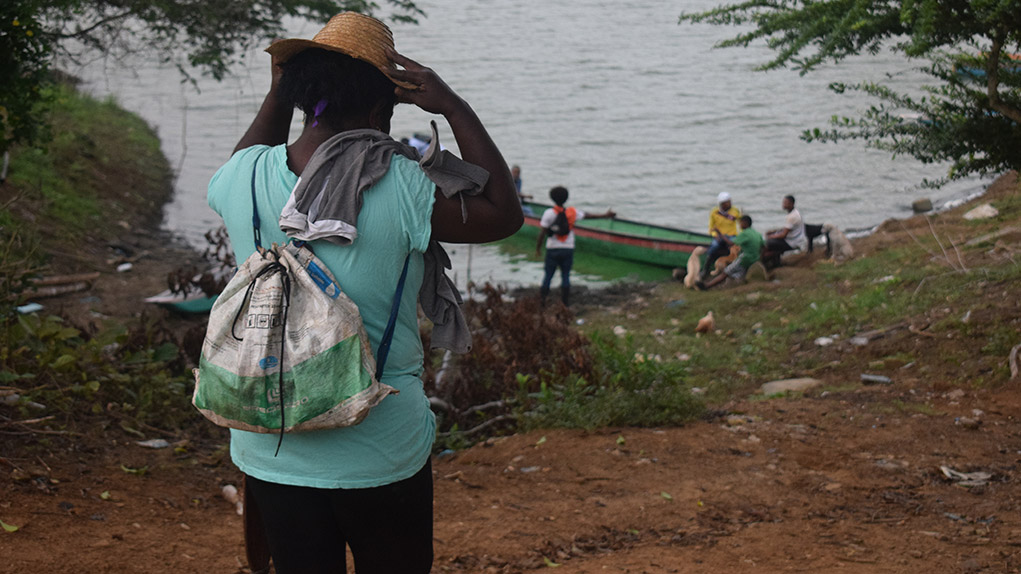
The women of Montes de María carry the “stigma” of not knowing how to work the land. “They say we burn the land,” complains Argelia Silgado Padilla, sitting on a red plastic chair in the courtyard of her home in Palo Altico. On one side of the clay oven, with rice drying on a slow fire, she recalls the years when she, her sisters and her father worked in the fields to support the family. “Ever since I was born and as long as I can remember, I have worked in the fields.
Ducks and chickens pass between her legs, while she remains silent, her eyes on the ground: she is in mourning. The night before (2 July) a woman was murdered in El Carmen de Bolivar. The facts are unclear, but one of the versions that circulated through the endless gossip was that a man had taken her life and then committed suicide. The killer was from Palo Altico.
Despite the lack of clarity about what happened, Algeria recalled how macho violence hovered over them, to the point of taking their life. “I have brothers who are male chauvinists,” lamented Algeria. This black woman, 48 years old, is the legal representative of ASOMOVICAMPO, a social process that brings together 18 peasant women victims of the armed conflict, all of them hard-working and “echadas pa’ lante” (always moving forward), as they say.
As well as claiming women’s rights and demanding a life free of violence, the organisation is also leading the fight for the right to land and territory in Palo Altico. “Women are treated very badly. Because men believe that women are only for washing and cooking and that they are not good at other things,” she says.
Faced with this reality, some of the women who belong to ASOMOVICAMPO have made it clear to their partners that their rights and dreams must be respected. One of their main desires is precisely to own land and to be able to develop their agricultural vocation.
Eight of the organisation’s women work on a 15-hectare plot of land near the town centre because of their advanced age and health. The others have to take a small boat for a 20-minute trip across the San José de Playón reservoir and then walk a little further up one of the foothills of the Montes de María. There, on the top of a steep mountain, they grow rice, sweet potatoes, melons, corn and dozens of other products that they sell and use for their own consumption.
If things had been different, if they had not had to gather as a community for a wake, the women of the association would have got up early to go to the farms to work the land. As Arelys Silgado, a member of the process, routinely does: she gets up at four in the morning, cooks for the whole family and goes with her two children to work her piece of land. But this time Algeria made the journey alone.
After leaving the boat that took her through the waters of the dam, she begins her walk through the bush with a machete hanging from her hip and a straw hat to protect her from the sun. In half an hour, she reaches a patch of ploughed, sprouting earth waiting to be cultivated. The sweat disappears from her face as she gets ready under a huge mango tree for the daily task she has dedicated her life to: working the fields.
Algeria’s husband has told other men that he appreciates his wife: “‘She is a woman who doesn’t give up. She is a woman who works and knows how to work. But not like many men who stay at home and do nothing,’ my husband has told many men,” says the leader.
As she mows the weeds that grow between the corn and proclaims her love for these lands, Argelia admits that she is not a native of this place. She was born in the neighbouring village of Santa Fe de Icotea and lived there until she was forcibly displaced in 2000.
At the beginning of the new century, fighting between paramilitary groups, the ELN guerrillas and the 35th and 37th fronts of the defunct FARC escalated in the region. This violence led thousands of families in the community to seek new land to live on. According to a report by the Land Restitution Unit (URT), there were 22,383 cases of forced displacement between 1990 and 2008. (Read more in The Terror that Displaced María La Baja and The Exodus of Mampuján).
This is the story of the women who were displaced from one community or another in Montes de María and ended up in the village of San José del Playón. There, in the village of Palo Altico, they occupied a piece of land where they now live. In 2006 they organised themselves into ASOMOVICAMPO and, according to Argelia, have been cultivating the mountainland for 17 years. But even these 20 hectares are not theirs.
Land ownership in the region has been in the hands of men, even though women are at the forefront of the collective processes of land reclamation. “The lack of recognition of the struggle of women in these processes of land and territory caused our exclusion from the ownership and titling of awarded lands,” says the text Montes de María and Canal del Dique, with a woman’s perspective, a booklet that collects the voices of dozens of women in the region.
However, a problem in the region is that businessmen with economic capacity have come to María La Baja to buy or lease land to convert it into monocultures, making land scarce or unaffordable for peasant communities.
Why haven’t the women of ASOMOVICAMPO ventured into these lucrative agricultural businesses? “It never occurred to us,” Argelia replies emphatically. “When you do mixed farming, you feel free not to be tied to a crop that has to pass through the hands of others,” she says, emphasising her peasant identity and her commitment to agroecological production.
“I feel that sowing the seeds and cultivating the land makes me happy,” says Algeria, adding: “I don’t need to have money because as long as I’m sowing, I have the means to support it.”
As part of this communal approach to production, in which no pesticides or agrochemicals are used, the women of the association are determined not to create physical boundaries between the plots: there is no barbed wire or fences dividing the land, and everyone knows where the other is planting. Their commitment is cooperative and they work together whenever they can.
“We come to this mango tree, we make a communal pot and we all plant rice. First, we go to one, then to the other, and so on, until everyone has planted their crop,” says the farmer as she delicately weeds a rice field. For women like her, maintaining a crop in good condition requires not only courage but also patience, which is why they believe in the organisation that has produced such good rice harvests.”
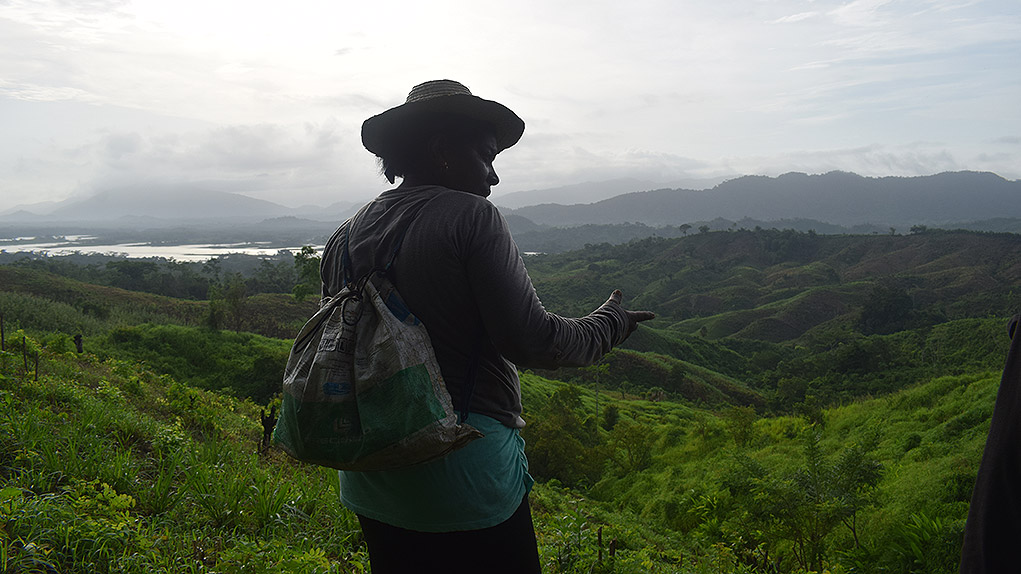
Independence and decision-making over the use of money are another of the organisation’s achievements. As small producers, they sell their crops to intermediaries in the region who collect the harvest from the farming families and take it to the central markets. In some households, it is the women who sell the produce, in others the men sell it and share the profits.
“Look, here’s your share and you do what you want,’ Algeria says to her husband when she sells the harvest, ‘but my share is this,’ and they share the household and the children’s expenses.
In the home of Victoria, one of Argelia’s sisters, who is also a member of the association, things are different, because she and her husband have set common goals: they agree on the products they need to buy for the home or work, and with the rest they provide for the family. But “this is yours and this is mine”, no. If I need to buy a new house, I don’t need to buy a new house. If I need to buy a skirt, yes, but the rest is for what is needed in the house,” says this woman.
However, they know that most women in the community do not have such an agreement. In many households, money management is in the hands of the men. “I think the woman who goes with the man to the bush, even to throw him a can of water, to make him a meal, is working. And it’s not as if, when he takes the money, he spends it himself and gives it to her to buy food on the spot, or says: ‘Let’s go to the shop and I’ll buy you everything’,” Argelia denounces, knowing that this is only one side of the violence that women suffer: the economic one.
“I want the land to be mine,” says Arelys Silgado, a wish shared by other members of the association, who see it as an obstacle that since they do not own the land, the current owner could sell or lease it to someone else, leaving them without land.
They also regret that, because they do not own land, they are excluded from government-sponsored agricultural projects and bank loans. “If God allowed it, I would have my own land to plant maize. Imagine, my God! I would open a ranch and live there, in the bush,” says Victoria enthusiastically.
This reality is reflected in studies carried out by the National Statistics Department (DANE). According to the document The Situation of Rural Women in Colombia, in 2019, 24.7% of agricultural production units (UPAs) will be run exclusively by women producers, while 73.2% will be run exclusively by men.
In terms of farm size, 60.1% of the UPAs where decisions are made only by women are less than three hectares in size, and in those with more than three hectares, the management is in the hands of men.
In Montes de María, they have been waiting for many years for the “opportunity” to receive the land as part of the agrarian reform policy. The women dreamed that the now-defunct Incoder would intervene to buy the land so that they could carry out more intensive farming projects. But their dream has been put on hold.
The women have applied to be included in the Register of Subjects of Ordinance, to be taken into account in any decision by the ANT. The most recent application was made earlier this year. “It’s been registered here, registered there,” says Arelys. And she regrets that, after all the paperwork, “nothing has come of it”.
VerdadAbierta.com sent a questionnaire to the ANT to find out the status of the women’s claim. In their response, they explained that according to Article 20 of Decree-Law 902 of 2017, a vulnerability study must be carried out and depending on the results, the available land will be allocated.
According to the regulations issued by the Agency in June 2023, the score establishes two variables that seek to favour women: on the one hand, a score of five points is assigned to “rural woman”. On the other hand, there is variable 12, which stipulates that “if the applicant is a rural woman who is the head of the household, she will be awarded double the total score obtained, without exceeding the maximum score established, i.e. one hundred (100) points”.
Figures provided by the ANT show that during the current government, only one piece of land has been acquired in the Montes de María region, in the municipality of San Jacinto, Bolívar, with a surface area of 54 hectares, which was granted to 10 peasant families. They’ve also clarified that, in this department, they’ve only prioritised the purchase of land in the municipalities of Córdoba and Zambrano. The rest will be in six municipalities of Sucre.
In addition, some analysts point out that the amount of land women have access to is not large enough to support their families. It is not a question of giving them land, they argue, but of giving them quality land of sufficient size to make it more productive.
“Whenever they ask us, we explain that it should be here on this land, that they will not give it to us elsewhere, that they should take this into account”, states Argelia, with the hope that one day the women of the organisation will be the owners. The reason for this request is based on the roots they have for these lands and because staying in the territory has become a strategy of protection against violence.
“Harvesting is life. And that is what we are, women who work and who always ‘need’ the land”, repeat the women of the association, from their productive patios to the leased land, while they wait for the state to listen to them. But machismo overshadows their aspirations.
Resist as owners

The best way to find the AFASAN women is to look for them at the farm they work on, on the side of the road in the village of San Cayetano, in the municipality of San Juan Nepomuceno. From the centre of the town, men on motorbikes who provide transport services have travelled to the site, but when this team of journalists asked to be taken there, not everyone knows it as the property of an association, but rather as “the invasion”.
A metal plaque on the fence at the entrance reads ‘Private Property’. Yeilis Escorcia has the key to the lock. Wearing a regional hat and carrying a woven bag, she opens the fence. “Welcome to the Santa Fe property,” she says. She is the legal representative of AFASAN, which has been working the land for more than 17 years.
“For me, the land and the territory are like the cradle of life, where you are born and grow. That’s where my memories are and that’s what makes me who I am,” says Yeilis.
In the early 2000s, dozens of women from San Cayetano began working in a cooperative whose main function was to export yams to other countries. “We started to work the land because, as women, we also had to support our families,” says Ingris Valdez, a member of AFASAN. The project was not as successful as they thought it would be, but since they were already together and wanted to work the land, they sought support.
“Someone told us about the Solidarity Development Corporation (CDS). We made contact and got to know Mr. Pedro Nel Luna (…) he helped us a lot… He helped us to organize ourselves as an association,” recalls Ingris. Thus, 36 women victims of the armed conflict began the process.
In 2006, looking for money where there was none, they gathered the documents and formalised Afasan. “We told him: ‘Well, Mr. Pedro, look, the organisation is already legalised, we have organised the board, we have the minute book, we have the book of accounts’. Then he told us: ‘Well, now look for a place to rent so that you can start growing vegetables,'” Yeilis recalls.
They looked at several properties, but none met their expectations. “Just as we were losing hope of getting the place, a colleague was told that there was a farm for sale near the town,” the woman recalls.
Two years later, in 2008, the Solidarity Development Corporation (CDS), with the support of international cooperation agencies, donated the eight-hectare, 1,926 square metre plot of land to the AFASAN women. This agreement was recorded in Public Deed 1066 of 28 May 2009.
With the institutional commitment to maintain a model of “silvopasture production integrating agroecological and environmental principles”, the women maintained an agricultural production area consisting of fruit, vegetables and pancoger, and a livestock area of about five hectares with jagüeyes and internal subdivisions for animal management.
“This was something that had never happened before in this community. First, that a group of women had land; second, that CDS not only gave us the land but also gave us several productive projects,” recalls Yeilis.
“We were overjoyed,” adds Ingris Valdez. “We were all happy and eager to work. We had all the good energy to work and we did. We didn’t mind the sun, we didn’t mind the rain. We started training, we went everywhere we could to train.”
Happiness was overshadowed by machismo. “When we went out, they said, ‘Look, women are leaving their husbands and going there. They travel around, who knows what they’re looking for,” Ingris complains. “People didn’t understand what was happening, they had never seen it before. They started calling us lazy, crazy, that we couldn’t do it because it’s a man’s job,” Yeilis adds.
“We would like the farm to be much better than it is, but with so many problems, we have had to defend ourselves rather than produce,” excuses Ingris as she walks around the property, showing off the fishpond and the corrals under construction.
Of the 36 women who have started the process, 10 are currently continuing it. “As a result of the threats, as a result of the robberies, you get tired,” Yeilis laments, and continues: “The women are tired, they are tired of discrimination. That’s why they have withdrawn from the trials.”

One by one, the AFASAN women have been subjected to all kinds of harassment and even crimes. The first was the theft of cattle. “We found out ourselves that the cattle had been taken from the farm, that they had stolen them. We started following the route the cattle had been taken” and took legal action to get them back. They hired a lawyer, went into debt and paid him by selling cakes in the community on Sundays. But they did not get the cattle back.
Their illusions did not allow them to see the risk. They were threatened and those who stole their cattle put a price on the heads of some of the husbands of the women in the association to stop them from investigating further.
“In the end, the state did not help us, the cattle were lost and we ran out of money,” says Ingris. But they still had their own land, so they started another project: beekeeping. “What happened? They burned our bees,” she says.
Machismo also had an influence, creating difficulties for its members, which manifested themselves in jealousy of their husbands; caring tasks that did not fit in with the time women wanted to devote to farm work and which became a burden for them; intimidation from the invasions; and social norms and beliefs that put additional pressure on their life projects.
Ingris highlights the attacks on their integrity that they had to accept: “Here, when we came alone, men were bathing in the wells, they would come, undress and bathe there because ‘we had to be at home looking after our husbands and doing our work’; and that we ‘had nothing to come here to look for, for the land.”
They started fish-farming projects in these wells, but the fish were stolen. They had chickens and they were also stolen. The same thing happened to some of the crops they had planted. But the worst was yet to come.
The COVID-19 pandemic hit in 2020, and while the women were taking shelter from the virus, on 17 June of that year dozens of people invaded the AFASAN compound, and although the police evicted them two days later, the invaders returned three days later to stay for longer. Although the mayor of San Juan Nepomuceno, Wilfrido Alonso Romero, went to the site to talk to them, he was unable to persuade them to leave.
“The mayor was out there meeting with the invaders and didn’t even ask us what had happened. That hurt us a lot,” Ingris recalls. It was up to one of them to confront the local mayor and ask for a meeting, and only then would they be listened to. But it was of little use.
All the women of AFASAN do not hesitate to say that their land has been invaded because they are women. “We border several farms,” says Yeilis, “because they belong to men, the others just don’t do anything there. So the other one, which has more land than us, they don’t invade it. Then we realise that it is because we are women. They think that because we are women, we are therefore vulnerable, that they can do whatever they want to us and our land.”
The occupiers damaged the fences, the cattle pens, the agroecological project infrastructure, the pancogar crops and the apiary, and contaminated the pond where they breed fish.
“It was terrible. To come and see them cutting down our trees, taking our banana plants… We saw them like little ants. And how could we go in and say something to them? Because there were people who were not respectable and we knew they could hurt us,” says Ingris.
Many women had to hide their pain, deciding not to express their anger and sadness at home for fear that their husbands or children would act against the invaders and make matters worse. “When I went to the toilet, I would scream and they wouldn’t notice,” says Teodora Ospino, a married mother of three who joined AFASAN a few years after it was founded.
Ingris also remembers: “When we sometimes felt the lack of support from the authorities, it was very hard. We cried. We left sad in the afternoon, but in the morning we came back with enthusiasm. We forgot about the pandemic and we came here, during that time, and started to fight for our country”.
“In the beginning, we had no support from the authorities, they did not listen to us as they should have,” says the association’s legal representative. Until Mayelis Chamorro Ruiz, the 3rd Environmental and Agrarian Prosecutor of Cartagena, began to intervene in the process and other state institutions began to act.
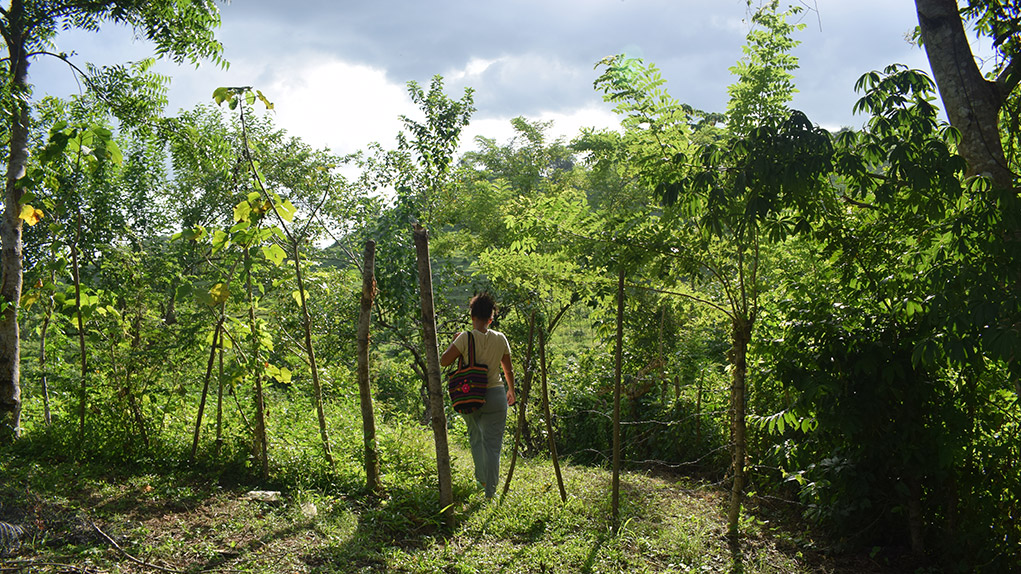
Accompanied by the CDS, the women sought protection from the Mayor’s Office and the municipal ombudsman’s office of San Juan Nepomuceno. They also asked the police inspector of San Cayetano to take action to recover the land. “We never stopped coming, there was the invasion, we came here. We went through all the places where they were, and they always said to us ‘women, this’, but we didn’t answer them,” says Teodora.
“Apparently, the denounced land invasion was announced by persons residing in the aforementioned village, an illegal act that took place on 17 June of this year,” states the letter sent by the Cartagena Public Prosecutor’s Office to the Police Commander of Bolivar, the Police Inspector of San Cayetano and the Mayor and Ombudsman of San Juan Nepomuceno.
During these days, the invaders sheltered in small plastic and wooden structures or ‘cambuches’ on the property. By 3 July, a group of officials from the municipal ombudsman’s office, the Family Commissariat and the Government and Planning Secretariats had recorded at least 27 of these shacks, some of which were occupied.
In the minutes of the San Juan Nepomuceno Municipal Ombudsman’s Office, the danger faced by the women is recorded: “The Commission makes contact with the women who are currently members of the San Cayetano Women’s Agricultural Association (AFASAN), represented by Mrs Yeilis Escorcia; they mention the intimidation, threats and verbal aggression to which they have been subjected by some of the people invading the land”.
It was not until 18 August that the final eviction took place, with the intervention of the mobile anti-riot police unit (ESMAD), but calm did not return. The women have received threats, which have taken the form of constant invasions of their land, insults and obscene acts aimed at dishonouring their status as women.
“We are going to destroy these damned women’s houses,” some of the invaders told the AFASAN members. Although they did not succeed, they broke the windows of Yeilis and Teodora’s house and damaged some of their belongings with the objects they threw. Yeilis even had vinegar thrown in her face one day.
“They tied toads to the door of my partner’s house. They also came to my house and broke my windows, they wanted to get in,” says Teodora. She believes the latter was because the CDS had given them some rolls of wire and the violent men wanted to prevent the women from reclaiming their land. “They knew it was there because a pickup truck had arrived and they had brought down all the rolls of wire,” she says.
“When they were on their way to my house, the neighbours gathered and said that if they messed with me, there would be stronger consequences,” said Duvis Ballesteros, pastor of an evangelical church and another member of the association. So they, along with their children and husbands, held back the violent people, hoping that the confrontations would not escalate.
During the struggle for ASAFAN’s land, 142 invaders filed a tutela action in their own name in the Municipal Court of San Juan Nepomuceno to defend their rights to life, health, human dignity and decent housing.
The plaintiffs hoped that the Mayor’s Office of San Juan Nepomuceno would be ordered to “regularise and legalise, with public deeds and registration in the appropriate public deeds office, the properties we currently occupy, to guarantee our rights”.
The group of invaders argued in their lawsuit that they lacked housing and were living in terrible conditions, aggravated by the health crisis caused by COVID-19. They also claimed that they had owned the property “for a long time”, although they had only occupied it for a month.
The mayor’s office presented its side of the story, rejecting several of the invaders’ arguments and even claiming that “the plaintiffs intend to dispose of a property owned by a private individual to grant it to other private individuals using expropriation, a circumstance that borders on the illegal”.
The Attorney General’s Office took the same line: “The fact that these families do not have a housing solution does not prevent them from violating the real property right of AFASAN which was donated by the CDS, since they have had such property and peaceful possession since 2008”.
The Ombudsman’s Office clarified that ‘the plaintiffs are not peaceful occupiers, but entered violently on 18 June this year, exercising intimidation and gender violence against women members of the Women’s and Agricultural Association of San Cayetano – AFASAN’.
In the end, the San Juan Nepomuceno court ruled against the invaders. However, the women feel that justice has failed them, as the damage to their land and integrity has gone unpunished.
Although they filed complaints naming the occupiers who had threatened them, three years have passed and the case is still pending. “Of those we knew who harmed us, they have never been brought to justice, nothing (…) Where are the rights?” asks Teodora. “But we are still fighting and we have hope that God will give us justice,” Ingris concludes.
By way of colophon
When they were being formed as Afasan, Pedro Nel Luna told the women a fable. A caterpillar had a dream of reaching the top of a mountain, day by day it climbed a little until halfway up it got tired, its body changed, it became a chrysalis and fell into a deep sleep. Days later, a butterfly emerged from the chrysalis and flew to the top of the mountain.
“Mr Pedro said to me: ‘I hope AFASAN will be like this worm. When it turns into a shell, it will come out as a beautiful butterfly and fly. And I believe it will. It has cost us a lot, but the time will come when things will work as we thought they would in the beginning, and there will be many families living off the land, and many women who understand that they too can work the land,” says Yeilis.
“On the contrary, we want to be an example for other women who are pushed down at home, who have no opportunities,” she adds. And so they have. AFASAN has set an example for the community of San Cayetano, where there are already five women’s organisations with different interests, such as yam processing, weaving or chicken farming, all claiming the right to work the land.
The difficult circumstances have made these women realise that together they can achieve great changes and fill the gaps that the state has refused to fill. There will certainly be new obstacles along the way, but their dream of one day living in dignity in the countryside will not let them lose hope.
***
This report was made in the framework of the Caribbean Women’s Coalition for Land and Territory and the Stand For Her Land-Colombia campaign.

